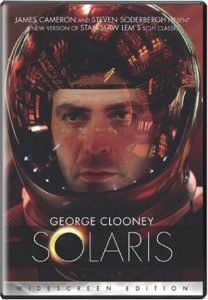 What do you think about movie remakes? (I don’t suppose anyone has tried to rewrite a book, so I can’t really ask about that. Unless someone has done so, in which case, please let me know! The fairy & folk tales I won’t count, mind, since they’re rather perpetually in flux. Neither do adaptations. How does one go about rewriting a book without it becoming a spinoff?) Personally, I haven’t watched too many remakes, but I did just watch two versions of Solaris within a week or so of each other, and the remake wasn’t terrible, which from what I understand is just short of a miracle.* (To really complete the post, I feel like I’d have to have read the original novel by Stanislaw Lem as well. Unfortunately, I haven’t gotten around to that just yet, but if anyone has, please let us know how you feel/felt about it!)
What do you think about movie remakes? (I don’t suppose anyone has tried to rewrite a book, so I can’t really ask about that. Unless someone has done so, in which case, please let me know! The fairy & folk tales I won’t count, mind, since they’re rather perpetually in flux. Neither do adaptations. How does one go about rewriting a book without it becoming a spinoff?) Personally, I haven’t watched too many remakes, but I did just watch two versions of Solaris within a week or so of each other, and the remake wasn’t terrible, which from what I understand is just short of a miracle.* (To really complete the post, I feel like I’d have to have read the original novel by Stanislaw Lem as well. Unfortunately, I haven’t gotten around to that just yet, but if anyone has, please let us know how you feel/felt about it!)
*I did also watch the remake of It, based on the behemoth of a novel by Stephen King. I haven’t watched the original, but I did enjoy the 2017 edition (even as I found it a little preachy during that one scene – was this influenced by the times, or is this also found in the original?).
Back to the main topic. The premise of Solaris is something like this: A psychologist, Kris Kelvin, is sent to the space station where a crew of scientists are studying the planet Solaris, in order to find out what’s happening there. The ocean covering Solaris has been conjuring “visitors” that come from the crew’s minds – it’s not apparent in the movies whether they represent the scientists’ greatest regrets or if they are simply taken from their minds, because one of the scientists implies his visitor is from his imagination rather than from his memory – and they are almost perfect replicas of their originals. Even more disconcerting: they cannot be killed, and if you remove them from the ship, another will take its place that is exactly as the first, which in turn was exactly like (in form) the original memory. What is Solaris trying to do? Is it possible to understand some other form of consciousness so beyond human understanding of consciousness? Do we even understand ourselves, and is it possible for us to extend our understanding to non-human consciousness (if it is indeed a consciousness) if we do not?
So how do the two movie versions compare?
 Let’s start off with Tarkovsky’s Solaris. I watched it in theatres, as part of the Poetry of the Apocalypse series at the TIFF I talked about earlier, which made me sit still and watch it all in one go – something I might not otherwise have done if I had tried to watch it at home. Which is not to say that it isn’t a good movie, because it does have its good points. It’s thought-provoking and the atmosphere the slow pace of the entire film creates is worth the time it takes to do so, though some might argue otherwise. All of the scenes focusing on the land- and oceanscape worked to generate this sense of the unknown, and the comparisons you cannot but draw between the two throughout the film – between the plants within the flow of the water at the pond or lake, and the swirling ocean of Solaris – make you wonder where you are, and whether there is any difference: more importantly, does the difference matter? In the end (spoiler alert!), does it matter that Kris thinks he has returned to Earth and made amends with his uncle, even though he has simply been sucked into Solaris? For Kris, it’s all the same, isn’t it? Yet we feel that there is something wrong with that, that there is some value to knowing where you are and your relation to the world around you. And where Solaris is concerned, both the viewer and the characters within the movie are left not knowing what Solaris wants from them, indeed whether Solaris wants anything at all. They assume the ocean does have intentions, but is it possible for us to know them when the oceanic consciousness is so far removed from what we know? And assuming the ocean does have intentions, and is a consciousness rather than simply a natural phenomenon, we are left in the dark as to whether these intentions can be decoded at all. There is much less of this eeriness in Steven Soderbergh’s 2002 take on Solaris than in Tarkovsky’s vision of it, and this makes quite a huge difference in what the take-home message is (or might be, considering there may not be one specific message to take away from either movie).
Let’s start off with Tarkovsky’s Solaris. I watched it in theatres, as part of the Poetry of the Apocalypse series at the TIFF I talked about earlier, which made me sit still and watch it all in one go – something I might not otherwise have done if I had tried to watch it at home. Which is not to say that it isn’t a good movie, because it does have its good points. It’s thought-provoking and the atmosphere the slow pace of the entire film creates is worth the time it takes to do so, though some might argue otherwise. All of the scenes focusing on the land- and oceanscape worked to generate this sense of the unknown, and the comparisons you cannot but draw between the two throughout the film – between the plants within the flow of the water at the pond or lake, and the swirling ocean of Solaris – make you wonder where you are, and whether there is any difference: more importantly, does the difference matter? In the end (spoiler alert!), does it matter that Kris thinks he has returned to Earth and made amends with his uncle, even though he has simply been sucked into Solaris? For Kris, it’s all the same, isn’t it? Yet we feel that there is something wrong with that, that there is some value to knowing where you are and your relation to the world around you. And where Solaris is concerned, both the viewer and the characters within the movie are left not knowing what Solaris wants from them, indeed whether Solaris wants anything at all. They assume the ocean does have intentions, but is it possible for us to know them when the oceanic consciousness is so far removed from what we know? And assuming the ocean does have intentions, and is a consciousness rather than simply a natural phenomenon, we are left in the dark as to whether these intentions can be decoded at all. There is much less of this eeriness in Steven Soderbergh’s 2002 take on Solaris than in Tarkovsky’s vision of it, and this makes quite a huge difference in what the take-home message is (or might be, considering there may not be one specific message to take away from either movie).
 Where Tarkovsky makes a point of including a heartfelt if drunken speech halfway through the movie asking why everyone was expending so much effort in reaching out further into space when what we really need is human connection and interaction, Soderbergh focuses more on the human interaction between the crew members, as well as between the individuals and their visitors. You also walk away from this (much shorter) movie knowing that there are consequences to our actions beyond what we may know, and that our impulse to destroy what we do not understand might not be the best of ideas. You get the feeling that the issue is now no longer so much that we are trying to expand our knowledge out into the rest of the universe without first understanding ourselves, but that it is now instead how we approach what novelties we come across that is the issue at hand. I’m pretty sure this is due mainly to the advancements in scientific knowledge since the production of Tarkovsky’s Solaris in 1972, but it could also just have been a personal choice on Soderbergh’s part.
Where Tarkovsky makes a point of including a heartfelt if drunken speech halfway through the movie asking why everyone was expending so much effort in reaching out further into space when what we really need is human connection and interaction, Soderbergh focuses more on the human interaction between the crew members, as well as between the individuals and their visitors. You also walk away from this (much shorter) movie knowing that there are consequences to our actions beyond what we may know, and that our impulse to destroy what we do not understand might not be the best of ideas. You get the feeling that the issue is now no longer so much that we are trying to expand our knowledge out into the rest of the universe without first understanding ourselves, but that it is now instead how we approach what novelties we come across that is the issue at hand. I’m pretty sure this is due mainly to the advancements in scientific knowledge since the production of Tarkovsky’s Solaris in 1972, but it could also just have been a personal choice on Soderbergh’s part.
In light of the way in which technology now pervades our everyday lives, there is a sense that Solaris could also be a stand-in for that virtual world in which all of us at live, at least in part. (And I can say all because you are currently reading this post.) Viewed in this light, the moral of the story changes a bit: we have expanded the web of communication, but at what cost? Can our interactions across the web, even with real people of flesh and blood on the other side of the screen, be the same as interactions that we do face to face? (Is the Rheya on Solaris Rheya? Though the issue of what Solaris presents is a little different, because it physically presents as a person, who – which? – develops over time to become more and more like the original by “recovering” their memories. But even with those memories, with the same physical features, are they simply a reproduction of your memory? How do they even know that Solaris is tapping into their memories to drag out their greatest regrets? There must have been some divergence from what the person remembered, strictly speaking, in order for them to realize that Solaris was working off of memory rather than actually reconstructing this person. But we’re straying from the topic at hand.) In relation to dealing with the unknown and allowing ourselves to deal with them in a less hubristic manner – i.e. let’s destroy these visitors without understanding them (in Soderbergh), and let’s just destroy the ocean itself (in Tarkovsky) – I view it more as a matter of dragging ourselves down from our pedestal, from thinking of humans as being the be all and end all to being able to then see our existence from a more humble point of view.
Have you watched any of the Solaris films? Any of Tarkovksy’s? Read any of Stanislaw Lem’s novels? Have they left you with just as many questions as when you went in?